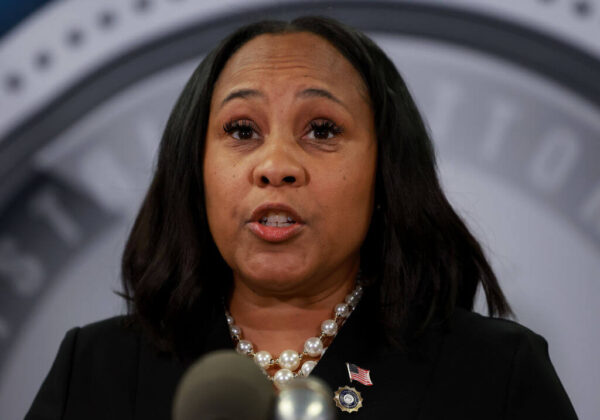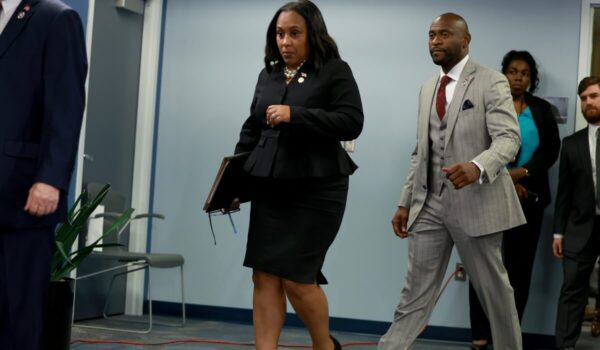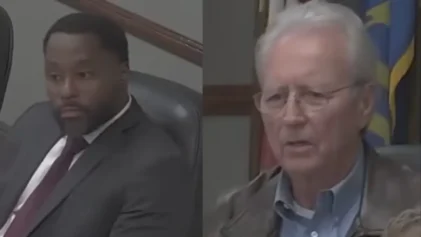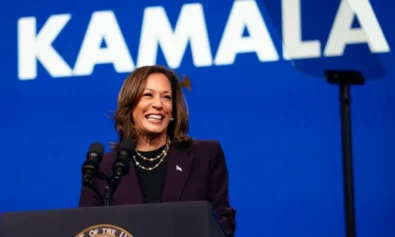Newly uncovered cellphone records suggest that special prosecutor Nathan Wade visited Fulton County District Attorney Fani Willis at her condo at least 35 times before they claim their secret romance began.
The Feb. 23 court filing cites findings by a private investigator that cast doubt on the truthfulness of last week’s testimony from Willis and Wade regarding when they started seeing each other privately.
If Fulton Superior Court Judge Scott McAfee determines that either Willis or Wade lied under oath, Willis could face perjury and immediate disqualification from the Georgia racketeering case against former President Donald Trump.

The filing was the latest from Trump’s legal team amid several motions to dismiss the case and disqualify Willis and Wade due to their behind-the-scenes involvement, which constituted a conflict of interest, attorneys argued.
The filing specifically took aim at the timeline that Willis and Wade provided under oath as to when the pair said their secret romance began.
During a fiery court hearing on Feb. 15, Willis refuted allegations of misconduct as Trump and his co-defendant’s attorneys claimed she benefited financially from her involvement with Wade.
McAfee has yet to issue a ruling but indicated previously that the alleged actions by Willis and Wade “could result” in their disqualification if the evidence supported an “actual conflict of interest or the appearance of one.”
Lawyers claim Wade and the DA began seeing each other before Willis hired Wade to oversee the Trump case on November 1, 2021. However, both Willis and Wade testified that their relationship didn’t turn romantic in early 2022 and ended more than a year later, in the summer of 2023.
Wade testified last week that he had visited Willis’s condo in Hapeville, Georgia, less than a dozen times before he was hired but noted that he “never” stayed overnight, a claim that Willis also confirmed in her testimony.
Judge McAfee will hear arguments on the matter on March 1 and could issue a ruling shortly thereafter, according to Trump’s lead Georgia attorney, Steve Sadow, who spoke to The Hill.
“So, if phone records were to reflect that you were making phone calls from the same location as the condo before Nov. 1 of 2021, and it was on multiple occasions, the phone records would be wrong?” Sadow asked Wade during last week’s testimony.
“If phone records reflected that, yes, sir. They’d be wrong,” Wade said.
Trump’s legal team submitted a report to the court from their investigator, who used a tool called CellHawk to study Wade’s cellphone data for the initial 11 months of 2021.
This analysis covers a period mostly before Wade’s contract with the district attorney’s office started and entirely before the prosecutors say their relationship began.
“This conservative analysis using the above referenced modality revealed a minimum of 35 occasions when Mr. Wade’s phone connected for an extended period to either one of those towers in closest proximity to the Dogwood address based upon associated data use, voice calls or text messages,” Charles Mittelstadt, the investigator, states in the filing while also noting: “The data reveals he is stationary and not in transit.”
Mittelstadt said he obtained other cellphone data from Wade through a records request made to AT&T, which revealed nearly 12,000 interactions with Willis over the phone, which included over 2,000 phone calls, over an 11-month period.

Mittelstadt pointed out two specific nights in September 2021 when Wade’s phone pinged at Willis’s condo around 10:45 p.m. and remained at the location until nearly 3:30 a.m.
The investigator also claimed that about half an hour after leaving the condo, Wade arrived at his own home and texted Willis shortly afterward.
Several weeks after Wade started working for Willis, she called him around 11:30 p.m. From there, Wade left his home at approximately the same time and later arrived near Willis’ residence, where he stayed until 4:55 a.m., the investigator alleged.
Wade testified that he might have been at locations other than Willis’ condo, such as the airport, restaurants, or the Porsche Experience Center, a popular attraction nearby.
Trump’s lawyer recently indicated that Mittelstadt was willing to testify under oath.
Meanwhile, Willis faces a March 7 hearing related to two ethics complaints arising from her relationship with Wade as yet another official proceeding threatens to derail the Trump case.
The Fulton County Board of Ethics announced a “special meeting” to address twin ethics complaints against Willis, related to Wade’s extramarital affair with Willis that came to light in a Jan. 8 motion to dismiss the charges against Trump and more than a dozen co-defendants in the state’s 2020 election subversion case.
One of the ethics complaints was originated by Gregory Mantell of the Substack blog Investigative News Service, who sent a letter to the board in January, accusing Willis of several ethical violations that emerged from her involvement with Wade, whom she appointed in 2021 to prosecute Trump on 13 criminal counts.
Earlier this year, Mantell said he requested Willis’ expense reports for 2021, 2022 and 2023, as well as all contracts and payments to Wade in those same years. He also sought records pertaining to $14.6 million in Department of Justice awards.
The second complainant is listed as Steven Kramer, however no personal information was provided about him.
The complaints were filed because Willis allegedly failed to release her public financial records, as required by law, which would have revealed invoices related to Wade’s expenses while overseeing Trump’s prosecution.
In late January, Fulton County released the financial disclosure forms, in which Willis reported no gifts in 2021 and 2022; however, this disagreed with credit card statements filed in Wade’s divorce case that showed he purchased airline tickets for Willis in 2022 and 2023.
Seeking to get to the bottom of the matter, the ethics board agreed to take up the complaints more than a week after Willis took the stand under oath at the separate court hearing to determine whether she should be disqualified from the Trump case.
From the stand, Willis criticized the subpoena seeking her testimony as a “ticket to the circus” and called out the pro-Trump lawyers for taking aim at her character to draw “more breathless media coverage and intrude even further into the personal lives of the prosecution team in an effort to embarrass and harass the district attorney personally.”
During the hearing, attorney Ashleigh Merchant accused Willis of benefiting from taxpayer money in an effort to boot her from the Trump case.
Willis denied the allegations of financial misconduct that emerged in the motion filed by Republican operative Michael Roman in early January, which claimed Willis took public funds as she accepted free travel and other perks during her whirlwind romance with Wade.
The allegations have become the central focus of the ethics complaints against Willis, setting the stage for the ethics board to take a deeper dive into Willis’ paper trail during the time she and Wade were together.
Wade also testified during the hearing, stating that Willis reimbursed him for trips they took together using cash.
He explained that expenses for the trips were roughly equal between them, and any reimbursements Willis made were in cash, without credit card statements reflecting these transactions.
In recent weeks, five defendants have petitioned the judge to dismiss the case and disqualify Willis from continuing to pursue the charges against Trump.
Legal experts say the scandal has the potential to derail Willis’ career as a firestorm of criticism continued to surround Fulton County’s lead prosecutor.
Previously, Judge McAfee dismissed a defense motion to dismiss the charges against Trump and the other accused. Meanwhile, a handful of Trump co-defendants have pleaded guilty in a deal to testify against the former president.


